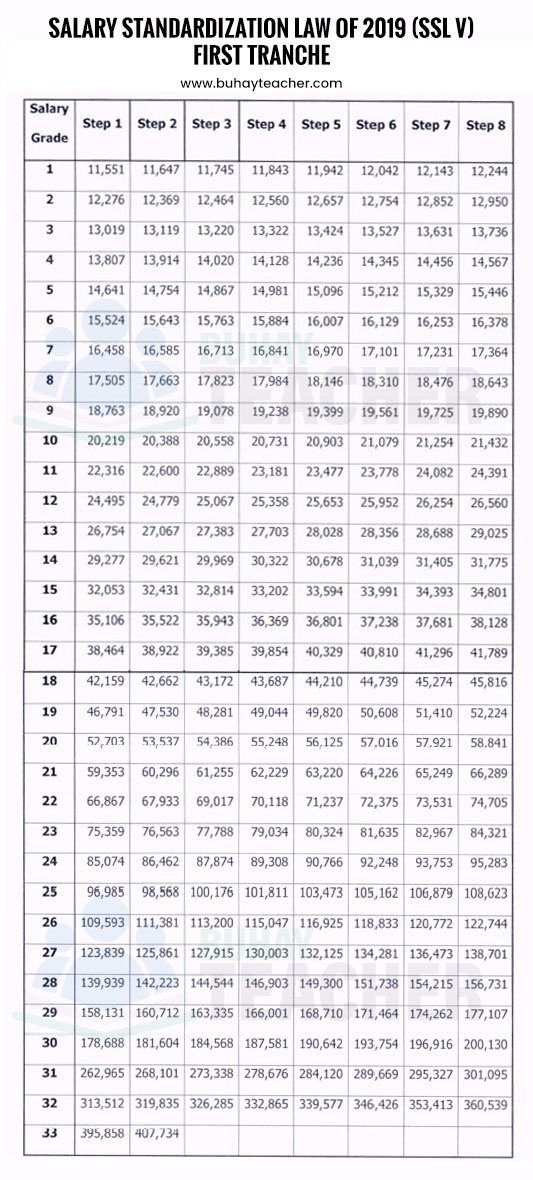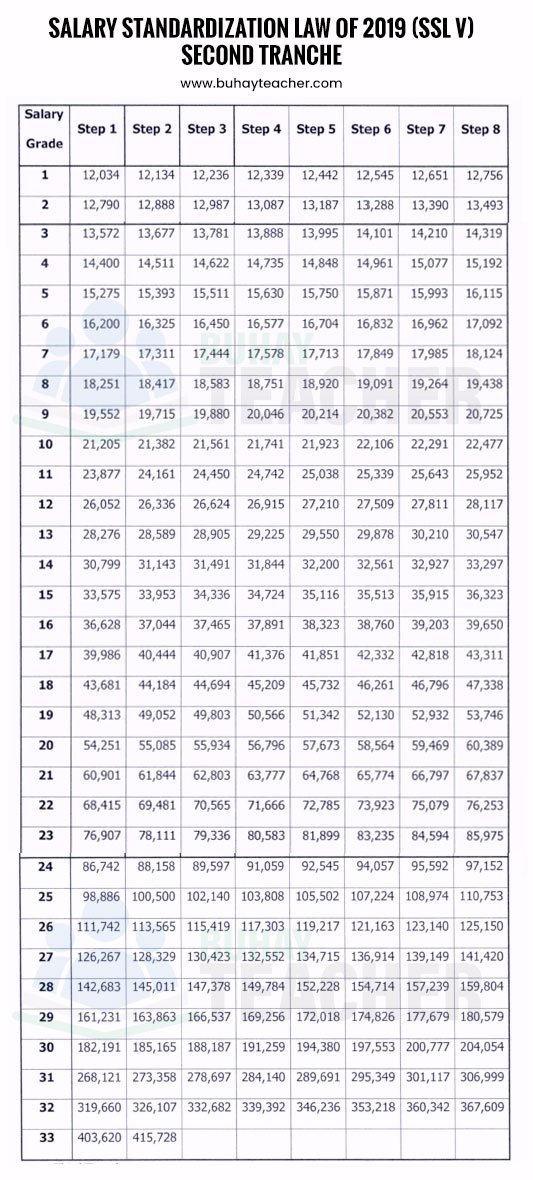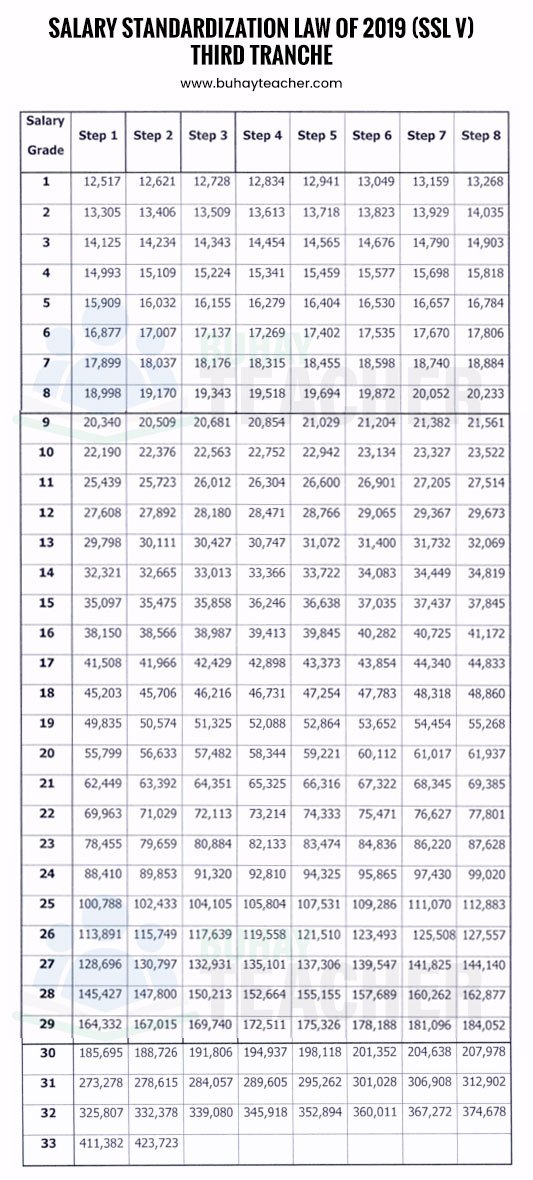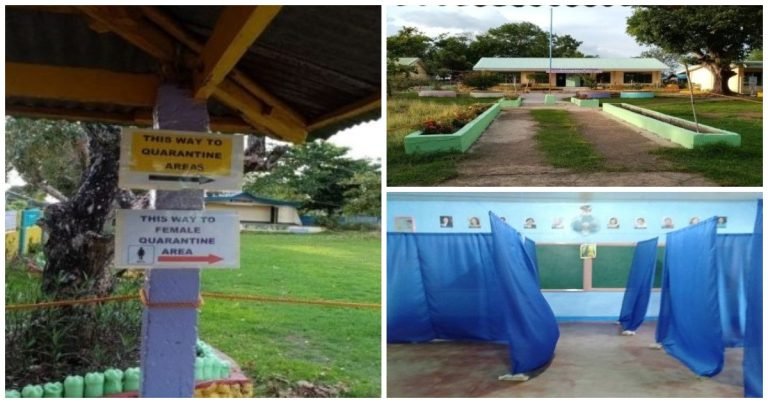Salary Standardization Law of 2019 (SSL V) Senate Bill No. 1219
(In Substitution of Senate Bill Nos. 49, 200, 1006 and 1136, taking into consideration Senate Joint Resolution No. 3)
Prepared jointly by the Committees of Civil Service, Government Reorganization and Professional Regulation; and Finance with Senators Ralph G. Recto, Christopher Bong Go, Joel Villanueva , Juan Miguel F. Zubiri, Ramon Bong Revilla, Jr. and Sonny Angara as authors
AN ACT
MODIFYING THE SALARY SCHEDULE FOR CIVILIAN GOVERNMENT PERSONNEL AND AUTHORIZING THE GRANT OF ADDITIONAL BENEFITS, AND FOR OTHER PURPOSES
Be it enacted by the Senate and House of Representatives of the Philippines in Congress assembled:
Section 1. Short Title. – This Act shall be known as the ‘‘Salary Standardization Law of 2019“.
Sec. 2. Statement of Policy. – It is hereby declared the policy of the State to provide all government personnel a just and equitable compensation in accordance with the principle of equal pay for work of equal value. In pursuing this policy, the State shall ensure that:
(a) Differences in pay shall be based upon substantive differences in duties, responsibilities, accountabilities and qualification requirements of the positions.
(b) The compensation for all civilian government personnel shall be standardized and rationalized across all government agencies to create an enabling environment that will promote social justice, integrity, efficiency, productivity, accountability and excellence in the civil service.
(c) The compensation of all civilian personnel shall generally be competitive with those in the private sector doing comparable work in order to attract, retain and motivate a corps of competent and dedicated civil servants.
(d) A performance-based incentive scheme that integrates personnel and organizational performance shall be established to reward exemplary civil servants and well-performing organizations.
(e) The compensation scheme shall take into consideration the financial capability of the government and shall give due regard to the efficient allocation of funds for personnel services, which shall be maintained at a realistic level in proportion to the overall expenditure of the government.
Sec. 3. Coverage. – This Act shall apply to all civilian government personnel in the Executive, Legislative and Judicial Branches, Constitutional Commissions and other Constitutional Offices, government-owned or -controlled corporations (GOCCs) not covered by Republic Act (R.A.) No. 10149, and local government units (LGUs). This shall cover government personnel whether regular, contractual or casual, appointive or elective; and on full-time or part-time basis.
Sec. Exclusions. – The following shall be excluded from the coverage of this Act:
(a) Military and uniformed personnel;
(b) GOCCs under A. No. 10149 which shall be covered by a Compensation and Position Classification System (CPCS) established by the Governance Commission for GOCCs (GCG) and approved by the President of the Philippines; and
(c) Individuals whose services are engaged through job orders, contracts of service, consultancy or service contracts with no employer-employee relationship.
Sec. 5. Position Classification System . – The following re-categorized groups of classes of positions prescribed and defined under Item (3) of Congress Joint Resolution 4, s. 2009 shall be maintained, i.e.: (i) Sub-professional Category; (ii) Professional Category; and (iii) Executive Category. The Index of Occupational Services, Occupational Groups, Classes and Salary Grades (IOS, for brevity) shall continually be reviewed and updated by the Department of Budget and Management (DBM) in consideration of substantial changes in and complexity of duties and responsibilities of positions, work methods, skills, competencies, and other relevant factors.
Sec. 6. Compensation System. – The Total Compensation Framework 18 established under Item (4) of Congress Joint Resolution No. 4, s. 2009, consisting of 19 the following components, shall continue to be adopted:
(i) Basic Salaries including StepIncrements;
(ii) Standard Allowances and Benefits;
(iii) Specific-Purpose Allowances and Benefits; and
(iv) Incentives
Sec. 7. Salary Schedule, including Step Increments. – The modified Salary Schedule for Civilian Personnel, to be implemented in four (4) tranches, shall be as follows:
First Tranche

Second Tranche

Third Tranche

Fourth Tranche

The rates in the above Salary Schedule represent monthly remuneration for regular or contractual personnel, whether appointive or elective, and on full-time employment. The remuneration for those on part-time basis shall be proportionate to the actual services
Casual personnel shall be paid daily wage rate computed by dividing the corresponding monthly salary rate in the above schedule by twenty-two (22) working days.
Sec. 8. Mid- Year Bonus. – As part of the Incentives under the Total Compensation Framework, the Mid-Year Bonus equivalent to one (1) month basic s salary as of May 15 of a given year, shall be granted to those who have rendered at least four (4) months of satisfactory service and are still in the service as of same date, to be given not earlier than May 15 of every
The existing Year-End Bonus equivalent to one (1) month basic salary and 12 Cash Gift of PS,000.00, which are categorized under the Standard Allowances and Benefits component of the Total Compensation Framework, shall be given in November of every year.
Sec. 9. Program on Awards and Incentives for Service Excellence {PRAISE). – The PRAISE instituted by the Civil Service Commission (CSC) pursuant 17 to the provisions of Executive Order No. 292 (Administrative Code of 1987) stipulating the establishment of an employee suggestions and incentive awards system, shall be categorized under the Incentive component of the Total Compensation The guidelines on the monetary and/or non-monetary rewards for recognition of personnel under the PRAISE shall be issued by the CSC in consultation with the DBM.
23 Sec. 10. Compensation Adjustment for Personnel of Local Government Units. – The modified Salary Schedule and additional Incentives authorized herein may be granted to personnel of LGUs subject to compliance with the Personnel Services (PS) limitation in the LGU budget under Sections 325 and 331 of R.A. No. 7160 and authorization from the Sanggunian as provided under Sections 447(a), 458(a) and 468(a) of R.A. No. 7160.
In the implementation of the salary increases, LGUs shall likewise ensure compliance with the following:
(a) The salaries of LGU personnel that may be authorized shall correspond to the s LGU’s income classification and shall not exceed the percentage of the Salary Schedule in Section 7 hereof, as follows:

(b) The basic pay of barangay personnel shall be in the form of honoraria consistent with A. No. 7160, which shall not exceed the percentage of the Salary Schedule corresponding to the income classification of the They may be given Year-End Bonus based on the monthly honoraria as of October 31 of the year and Cash Gift of PS,000.00.
However, the minimum Year-End Bonus of One Thousand Pesos (P1,000.00) for the Punong Barangay and Six Hundred Pesos (P600.00) for others mandatory barangay officials shall not be subject to the PS limitation.
(c) n case of partial implementation of the authorized compensation rates, the same shall be at uniform percentage across all positions for every LGU.
Sec. 11. Implementation Schedule. – For personnel of National Government Agencies (NGAs), the Salary Schedule in Section 7 hereof shall be implemented in four (4) tranches, with the first tranche beginning on January 1, 2020, the second tranche beginning on January 1, 2021, the third tranche beginning on January 1, 2022 and the fourth tranche beginning on January 1, 2023.
For personnel of GOCCs and LGUs, the implementation period shall be not less than four (4) years depending on their financial capabilities: Provided, That the initial implementation shall not be earlier than January 1, 2020.
Sec. 12. Exempt Entities – Exempt entities refer to: (i) government agencies that are not covered by the CPCS authorized under A. No. 6758, as amended; (ii) GOCCs governed by the CPCS established by GCG under R.A. No. 19 10149; and (iii) those authorized by law and have actually adopted their own compensation and position classification system.
Exempt entities shall be governed by their respective compensation and position classification systems which shall be made effective upon the recommendation of the DBM or GCG, as the case may be, and approval by the President of the Philippines.
Sec. 13. Applicability to Certain Officials. – Pursuant to Section 6 of Article VII and Section 10 of Article VI of the Constitution, the salaries authorized herein for the President of the Philippines, Vice-President of the Philippines and Members of Congress shall take effect only after the expiration of the respective terms of the present incumbents.
Sec. 14. Funding Sources – The funding sources for the amounts necessary to implement this Act shall be as follows:
(a) For NGAs, the amount needed for the salary adjustment in FY 2020 shall be charged against any available appropriations in the FY 2020 General Appropriations Act and any other available and valid appropriations. Thereafter, such amounts as are needed shall be included in the annual General Appropriations Act.
(b) For GOCCs, the amounts shall come from their respective corporate funds in the corporate operating budgets approved by DBM. GOCCs which do not have sufficient funds shall only partially implement the rates of compensation authorized herein: Provided, That any partial implementation shall be at uniform proportion of such rates for all positions in each GOCC.
(c) For LGUs, the amounts shall be charged against their respective local government funds in accordance with the pertinent provisions of this Act and R.A. No. 7160.
Sec. 15. Implementing Guidelines. – The DBM shall issue the guidelines necessary to implement specific provisions of this Act.
Sec. 16. Separability Clause. – If for any reason any section or provision of this Act is declared to be unconstitutional or invalid, the other sections or provisions thereof which are not affected thereby shall continue to be in full force and effect.
Sec. 17. Applicability of Presidential Decree No. 985 as Amended by Presidential Decree 1597 and Other Related laws. – All provisions of P.D. s No. 985, as amended by P.D. No. 1597, R.A. No. 6758, Congress Joint Resolution 1, s. 1994, Congress Joint Resolution No. 4, s. 2009, and Executive Order No. 201, 2016 which are not inconsistent with, expressly modified, revoked or repealed in this Act shall continue to be in full force and effect.
Sec. 18. Repealing Clause. – All laws, decrees, orders, rules or regulations or parts thereof inconsistent with the provisions of this Act are hereby repealed, amended, or modified accordingly.
Sec. 19. Effectivity. – This Act shall take effect on January 1, 2020.



